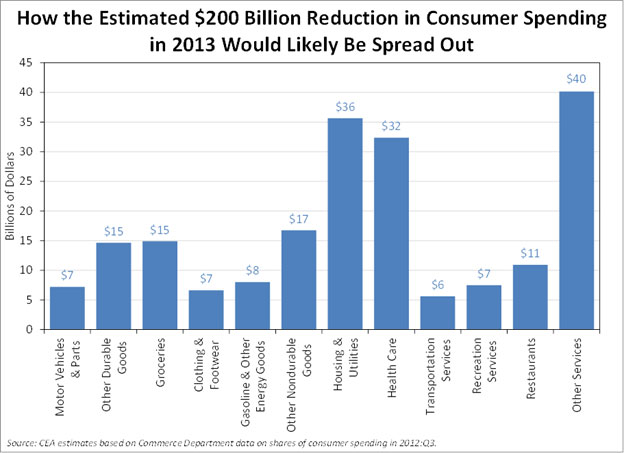
Today, as we move into the holiday shopping season, the National Economic Council and the Council of Economic Advisers released a report called The Middle-Class Tax Cuts’ Impact on Consumer Spending and Retailers. This report provides new analysis on the impact to retailers and consumer spending if Congress fails to act to avoid taxes going up on 98 percent of Americans at the end of the year.
If Congress doesn't act, middle-class families will see their income taxes go up on January 1st. The typical middle-class family will see their taxes go up by $2,200 next year, negatively impacting businesses and retailers across the nation. The President has called on Congress to take action and stop holding the middle class and our economy hostage over a disagreement on tax cuts for households with incomes over $250,000 per year.
While the President is committed to working with Congress to reach compromises on areas of disagreement, there is no reason to delay acting where everyone agrees: extending tax cuts for the middle-class. There is no reason to hold the middle-class hostage while we debate tax cuts for the highest income earners.
Our economy can’t afford that right now. New analysis by the President’s Council of Economic Advisers (CEA) finds that:
- Allowing the middle-class tax rates to rise and failing to patch the Alternative Minimum Tax (AMT) could cut the growth of real consumer spending by 1.7 percentage points in 2013. This sharp rise in middle-class taxes and the resulting decline in consumption could slow the growth of real GDP by 1.4 percentage points, which is consistent with recently published estimates from the Congressional Budget Office.
- Faced with these tax hikes, the CEA estimates that consumers could spend nearly $200 billion less than they otherwise would have in 2013 just because of higher taxes. This reduction of $200 billion is approximately four times the total amount that 226 million shoppers spent on Black Friday weekend last year. As the figure below shows this $200 billion reduction would likely be spread across all areas of consumer spending.

American consumers are the bedrock of our economy, driving more than two-thirds of the overall rise in real GDP over 13 consecutive quarters of economic recovery since the middle of 2009:
- Consumer spending makes up roughly 70 percent of the American economy, as measured by Gross Domestic Product.
- Consumer sentiment is at its highest level since September 2007, after plummeting in the summer of 2011.
- The National Retail Federation is forecasting that holiday sales will grow 4 percent this year to $600 billion. Last year, consumers spent around $50 billion on Black Friday Weekend alone.
- The retail industry employs 15 million Americans, and has been responsible for 9 percent of total employment growth in the 40 months since the recession ended in June 2009.
And as we approach the holiday season, which accounts for close to one-fifth of industry sales, retailers can’t afford the threat of tax increases on middle-class families.
The President has called on Congress to take action and stop holding the middle class and our economy hostage over a disagreement on tax cuts for households with incomes over $250,000 per year. The Senate has passed this bill and the President is ready to sign it.
President Obama understands we must take a balanced approach to reduce our deficit, that’s why he has laid out a $4 trillion deficit reduction plan that asks the wealthy to pay a little more and preserves the investments we need to grow the economy. The President has already signed $1.1 trillion in spending cuts and he looks forward to working with Democrats and Republicans on a balanced approach to further reduce our deficit. This is an important moment not just to avoid the fiscal cliff—but to lay the groundwork for an economy that will support a healthy middle class, restore economic certainty, and lead to long-term job growth.
Jason Furman is the Principal Deputy Director of the National Economic Council


